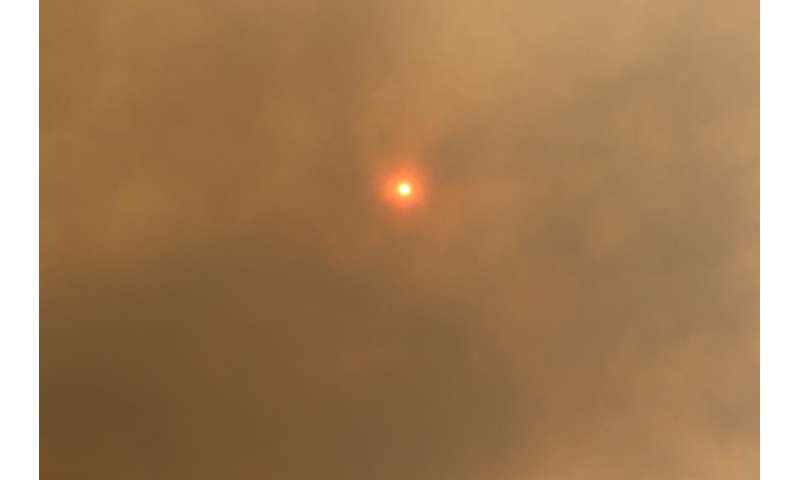
Immediate actions are needed to limit the greenhouse gas emissions that are driving climate change that helps fuel wildfires, a Monash University study says.
A special report published in the New England Journal of Medicine, led by Professor Yuming Guo and Dr. Shanshan Li from the Monash School of Public Health and Preventive Medicine, summarizes the enormous impacts of climate change on wildfire seasons and the sequential increased morbidity, mortality, and mental health impacts.
The report, which analyzed numerous studies on wildfires over the past 20 years, says global climate change is fueling the three essential conditions for wildfires—fuel, oxygen and an ignition source. The world is seeing inconsistent rainfall, increased drought and hotter temperatures, leading to more flammable vegetation.
It says the global mean carbon dioxide (CO2) emissions from wildfires accounted for about 22 percent of the carbon emission from burning fossil fuels between 1997-2016. The inconsistent approach to global forest management and the conversion of tropical savannas to agricultural lands is damaging the world's ability to absorb CO2 and cool the climate.
The report says projections suggest that if high greenhouse gas emissions continue, wildfire exposure could substantially increase to over 74 percent of the global land mass by the end of the century.
However, if immediate climate mitigation efforts are taken to limit the global mean temperature increase to 2.0˚C or 1.5˚C, a corresponding 60 percent and 80 percent, respective increase in wildfire exposure could be avoided, the report says.
Reaching the 1.5°C target would require reducing global net CO2 emissions by about 45 percent from 2010 levels by 2030 and reaching net zero around 2050. The 1.5°C target remains achievable if CO2 emissions decline by 7.6 percent per year from 2020 to 2030.
The report says the devastating health impacts are illustrated by several large and—in some cases—unprecedented recent wildfires. These include the 2019-2020 Australian wildfires, the 2019 and 2020 Amazon fires in Brazil, the 2018 and 2020 wildfires in the western US, the 2017-2018 wildfires in British Columbia, Canada, and the ongoing record-breaking wildfires on the US West Coast.
Along with the increased eye irritation, corneal abrasions and respiratory impacts of the smoke, the psychological effects are equally as serious with post-traumatic stress disorder (PTSD), depression, and insomnia common. The psychological consequences of wildfire events can persist for years, with children and adolescents particularly vulnerable.
A 20-year study on adults exposed to an Australian bushfire disaster as children in 1983 found an increase in psychiatric morbidity in adulthood, with wildfire events associated with subsequent reductions in children's academic performance.
The report says the current exchange between wildfires and climate change is likely to form a reinforcing feedback loop, making wildfires and their health consequences increasingly severe, unless we can come together to reduce greenhouse gas emissions.
Explore further
Citation: Feedback loop means bushfire health impacts likely to be more severe with climate change (2020, October 12) retrieved 12 October 2020 from https://ift.tt/2SJK7Q4
This document is subject to copyright. Apart from any fair dealing for the purpose of private study or research, no part may be reproduced without the written permission. The content is provided for information purposes only.
"severe" - Google News
October 12, 2020 at 08:02PM
https://ift.tt/2SJK7Q4
Feedback loop means bushfire health impacts likely to be more severe with climate change - Phys.org
"severe" - Google News
https://ift.tt/2OrY17E
Shoes Man Tutorial
Pos News Update
Meme Update
Korean Entertainment News
Japan News Update
Bagikan Berita Ini















0 Response to "Feedback loop means bushfire health impacts likely to be more severe with climate change - Phys.org"
Post a Comment